
Flavours and memories that connect us: video of the CAPAZ and Truth Commission event
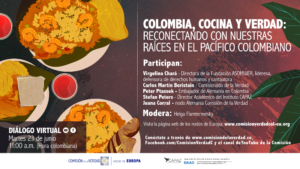 To discuss the armed conflict in Colombia while we cook. To share recipes and experiences of exile and the diaspora. To contribute via multiple voices to the truth about the conflict, the conflict that forced us to leave our own country. It may seem contradictory to review topics that can be painful and relating them to joyful encounters, experimentation, and creativity.
To discuss the armed conflict in Colombia while we cook. To share recipes and experiences of exile and the diaspora. To contribute via multiple voices to the truth about the conflict, the conflict that forced us to leave our own country. It may seem contradictory to review topics that can be painful and relating them to joyful encounters, experimentation, and creativity.
The virtual event “Colombia, food and truth: Reconnecting with our roots in the Colombian Pacific”, held on June 23, 2020 and organised by CAPAZ, the Colombian Truth Commission and Nodo Alemania supporting the Commission, in conjunction with the International Catalan Institute for Peace – ICIP.
Virgelina Chará, singer and community leader from the Colombian Pacific guided the cooking. The recipe? The typical Aborrajados. Helga Flamtermesky moderated the meeting from Catalonia. Other speakers included Juana Corral and Lorena Díez from Nodo Alemania also participated. The practical objectives were to publicise the work of the Commission’s support groups abroad (Nodos) and to launch the website for the groups in Europe: https://comisionverdadcol-eu.org/
Experience the event and learn how to make your own aborrajados by watching the recording of the event available on the Commission’s YouTube and Facebook
“Dear Virgelina: Thank you very much!”
Virgelina Chará is the director of the ASOMUJER Foundation, community leader, singer and human rights defender. With her daughter and grandson’s help, Virgelina patiently explained how to cook aborrajados. A dish typical of her native Pacific region, now so far away from her home in Bogotá, but which she regularly travels back to when she is in her kitchen.
“How are they coming along, Mr. Ambassador?”, Virgelina asked Peter Ptassek, the German Ambassador to Colombia, who took up the challenge of making aborrajados in his kitchen. He was joined by CAPAZ Academic Director, Stefan Peters.
“I want to close with a little piece from some lyrics that I composed called: ‘let’s work towards peace’. It has to do with the political situation we are currently experiencing”. Virgelina’s composition is proposed as a testimony of what is happening in Colombia at the moment. And it goes like this:

Virgelina Chará. Screenshot of the streaming.
Let us work towards peace, Colombia will make it. Foreigners and Colombians, let’s treat each other like brothers.
Do not cause more war, it affects us all, it drives us to poverty;
accept reality, respect ethnic and cultural diversity.
Let us work towards peace, Colombia needs it. We have many problems, but even more beautiful things.
“Mr. Ambassador, take them out of the oil”
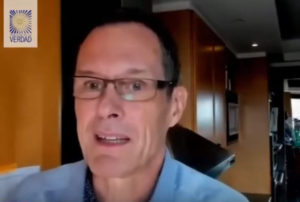
Peter Ptassek from his kitchen. Screenshot of the streaming.
Breaking down fears, as Virgelina taught him, the German ambassador in Colombia made his aborrajados à la Ptassek. He praised the resilience and courage of people like Virgelina. He celebrated the exercise of memory and dialogue in the kitchen. With an image in his words, Peter Ptassek explained the transcendence of what it is that is actually “cooked” in these encounters: “If it’s not working in the kitchen, it’s not working in the city”. It applies to the country: to peace in the country.
Stefan Peters was praised for his aborrajado; Virgelina suggested “we could open a restaurant, Stefan!” Beyond his culinary skills, the CAPAZ Director stressed the importance of participating, from Colombia and beyond, in the processes of memory and truth.
Through the Commission’s support groups in different countries, Colombian women and men abroad can give their testimony, voluntarily, safely and confidentially, and participate in building this common narrative. The support of host governments and societies to the Colombian diaspora in the 23 countries where the Nodos are present is key in this process.
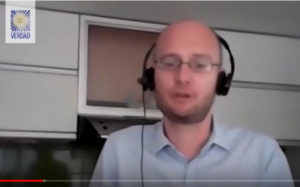
Stefan Peters from his kitchen. Screenshot of the streaming.
“I really miss plantain here in Norway”
People connected through the virtual platform simultaneously from Bogotá, La Vega (Cundinamarca), Buga (Valle), Santander de Quilichao (Cauca), Berlin (Germany), Chile, Aldana (Nariño), Popayán (Cauca), Brussels (Belgium), Barcelona (Catalonia), Florence (Italy), The Hague (Netherlands), London (UK), Canada, Norway, Sweden, Girona (Spain), Ecuador, Nariño, Urabá/El Darién, New York, Geneva (Switzerland), Cali, Orlando (Florida), Zipaquirá (Cundinamarca), and Medellín.
The audience in Colombia was very diverse: while most of the participants were in Bogotá, an outstanding percentage of those connected came from Antioquia (8%), Valle del Cauca (6%) and Cauca (3%). The event was a success in terms of the size of the audience: 423 people participated via the YouTube channel and 138 via Facebook Live, both of them social networks of the Commission. In total there were 561 participants. As of the date of publication of this review, the recording of the event had been viewed 5,800 times on Facebook alone and shared more than 130 times.
The expected international scope was also reached: 11% of the audience was concentrated in Germany and Spain; and, in general, 44% of the audience participated from outside Colombia. Berlin alone concentrated 6.5% of the total audience!
The German group (Nodo Alemania) shared audio testimonies about the most memorable Colombian flavours for those who now live in Germany: coriander, fruits, and arepa. A list of ingredients and recipes that, by way of exile, invite reflection on the role of food in experiences of memory.
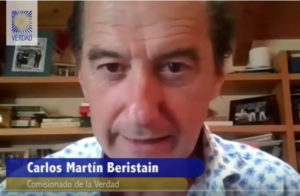
Commissioner Beristain participated in the virtual event. Screenshot of the streaming.
What happens when conflict forces people to leave their food and recipes behind? How do habits, life itself, change and what remains? What do food, sowing and harvesting conceal, and what value do they have for the communities? Once the transmission began and until the end, the comments were moving and motivating. “Cooking collectively is a way to strengthen the community, to tell stories, to share memory through a dialogue of knowledge. It is a collective well-being”, commented one attendee.
“Colombia needs a common table”: Commissioner Carlos Beristain
Commissioner Carlos Beristain welcomed the website as a new space for communication between and with the Commission’s support groups in Europe. He appreciated their enthusiastic, voluntary and valuable work, and the support of the host countries.
The Commissioner shared a story about the relationship between food and country. A Colombian member of the LGBTI community came to Spain because of persecution. He was very angry with Colombia and, while in Spain, he reconciled with the country by getting together with other Colombians to cook. Colombia needs a common table, which is not exclusive and summons all voices, including those outside its borders. “The framework of the kitchen is a framework for dialogue”, Beristain said.
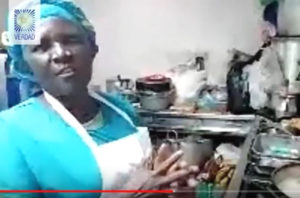
Virgelina Chará from her kitchen. Screenshot of the streaming.
In the end, there were some well-made aborrajados, some of which were actually cooked during the event. Beginners’ luck, some would say. In short, he stressed the importance of food as an absence, but at the same time as an encounter and joy for those who had to migrate within the country, like Virgelina, and outside it. Virgelina Chará left a clear message about the importance of good nutrition as a prelude to peace, reconciliation and the protection of human rights.
Experience the event and learn how to make your own aborrajados by watching the recording of the event available on the Commission’s YouTube and Facebook.
Do you want to meet the Europe groups, join their activities and write to them? Visit:
https://comisionverdadcol-eu.org/
(NW Text: Claudia Maya. English version: Tiziana Laudato)



